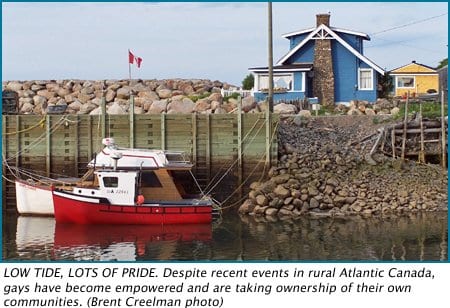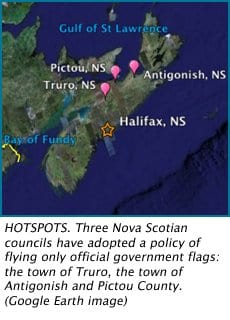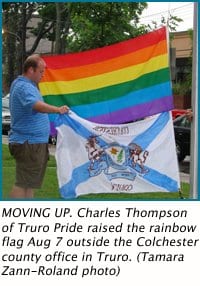***
Atlantic Canadians have long held a reputation for being the friendliest people in Canada but several recent incidents affecting the queer community in Nova Scotia have called this much vaunted warmth and openness into question. Is there a spreading stain on Nova Scotia’s rainbow tartan?
In the summer of 2007, the Truro town council was approached by the local Pride Committee to fly the rainbow flag at Town Hall. The mayor, citing religious beliefs, and backed six votes to one by the council, refused. A complaint was filed with the Nova Scotia Human Rights Commission. The decision is still pending.
Charles Thompson, who headed Truro Pride, told me that he was to “sit down with the town in mediation in the next month to see if things can be settled. If not, the complaint will move forward and there will be hearings.”
In the interim, Truro town council enacted a policy of not flying any flags except those of the town, province, nation and First Nations, hoping thereby to sidestep the whole controversy.
This would have been an isolated incident until February 4, 2008 when Pictou County followed Truro’s example and changed its official policy to fly only official government flags. It’s a decision that seems out of step with the Pictou County Tourism website which talks of “community of communities” “rich in cultural diversity” and which invites visitors to “join in the celebration of our communities at our multitude of festivals, parades and community gatherings.”
The vote was very close (seven votes to six) and the council received letters supporting the flying of the flag from the Nova Scotia Rainbow Action Project and Pride groups from many places, including Detroit.
Ramona Westgate of Pictou County Pride said on a recent radio interview on CKDU from Dalhousie University that this was “a policy born in homophobia.” Because the Town of Pictou (as opposed to the county) flew the Pride flag in 2006 and New Glasgow raised the rainbow in 2007 (both towns are located in the county of Pictou), Westgate had felt sure that the attitudes of the Truro council did not exist in her home area. Now her faith is shaken and she feels both “dumbfounded and heartbroken.”
Allister MacDonald, Warden of Pictou County has stated that the decision was in no way homophobic, but his rhetoric is unconvincing. Of course, there are fair-minded politicians in Pictou County, foremost among them Councillor David Parker. He told local activist Jane Corrigan about the agenda of the meeting beforehand so that she could make a presentation on behalf of the gay and lesbian community. Corrigan in turn told members of the Pride of Pictou County and then the media learned of the story.
If not for the action of David Parker, the process would have happened quietly without any attention, which was the case in Antigonish. That city is home not only to St Francis Xavier University but also to a Highland Games that attracts visitors from all over the world. Judy Hines of X-Pride, the queer student group at St F X, says that initially they were told by the mayor that they “could fly the flag at Town Hall and then later told we couldn’t because of a policy.”
Then the group approached the university, where they were told they could raise the flag over Nicholson Hall, the tallest building on campus, and then permission was withdrawn because, you guessed it, there was a policy.
The Pride Parade did take place in October and the flag did fly over the doors of the president’s office but why did such a simple request create such a complicated process? I spoke with Mayor Kathleen Chisholm by phone and she says there was some confusion over the terms banner and flag. She thought that the request was for her to help carry the banner in the Pride March, which, she says, she would have been happy to do if an out of town meeting had not kept her away that day.
Chisholm says there was a general policy to only fly government flags, although she admits the policy just became officially read into the minutes in February 2008, almost four months after the request from X-Pride. One might be forgiven for being suspicious of the timing, especially since the website for the town, under banners and flags, makes no mention of this restriction.
Mayor Chisholm denies any taint of homophobia and says she would be “happy to put up a rainbow banner [not a flag] at Town Hall” and “add my presence to the dignity of their cause” at the next Pride March.
Do these events indicate a trend? Is there a conservative backlash happening in Canada’s ocean playground? Tourism is big business here with groups like Destination Halifax, for example, doing their best to make Halifax and the province attractive to travellers. Part of Destination Halifax is Rainbow Halifax, which is focussed specifically at gay and lesbian visitors. In Truro, the flag decision was followed by many travellers calling to cancel their visit to the area, citing the council decision as the reason. Money talks and gay-friendly consumers can have a very loud voice.
So, why is this happening now? In 2005, Nova Scotia was the scene of the first same-sex soldier wedding on a military base. The following year we had the first gay Mounties married and last summer federal MP Scott Brison married his partner. All these events happened with little fuss or bother; in fact reporters were frustrated in their search to find local residents ready to condemn or respond negatively to any of the three weddings.
What has changed is the attitude that one must go to a larger centre like Halifax to celebrate his or her pride. Halifax has the fourth largest Pride celebration in Canada, but increasingly, local groups are approaching their own governmental jurisdictions to celebrate. Charles Thompson just wanted to feel accepted and welcome in his own town and not have to leave Truro in order to be himself.
Raymond Taavel, national president of Fierté Canada Pride believes there is something positive to be seen in the events of the last year. He explains that when queer folk in small towns begin feeling “empowered enough to approach their local councils, [that] is huge progress.”
Helen Kennedy of Egale says she, too, is glad that queer individuals are taking ownership of their own communities. But she is “very concerned” about the negative way some rural communities have responded and warns how these stories “escalate negativity.” What message does it send to queer members of that community? she wonders.
But there can be unexpected bonuses, too. After the Truro decision, the mayor of Colchester County stepped forward offering to fly the flag at the municipal office, which just happens to be in Truro. Amherst also indicated it would welcome the opportunity. Mayor John Morgan of the Cape Breton Regional Municipality has taken a strong public stance supporting Pride activities.
In rural areas on the South Shore and in the Annapolis Valley, there are monthly dances for the queer community that are popular and well attended. An openly gay mayor resides in the Annapolis Valley and his partner is warmly greeted at all official functions.
What about other parts of Atlantic Canada?
There are Pride celebrations in Charlottetown, but as chair Michael Walsh says, “PEI is a small province and having separate pride celebrations is just not realistic.” On the other hand, they are “offering the Summerside area a key night during the week to accommodate the communities in that area.”
Queer New Brunswickers also faced obstacles on the road to Pride. In 1998, Fredericton Mayor Brad Woodside refused to proclaim Pride Week until forced to do so by the New Brunswick Human Rights Commission. By contrast, organizers of FurFest, an international gathering of bears, were approached by merchants and hotel owners in Fredericton offering special rates and discounts for those attending the event.
Outspoken MP Elsie Wayne’s famous advice for gay people to just “shut up” sparked even greater public support for Saint John’s first gay Pride Parade in 2003. Moncton, Saint John and Fredericton all have annual Pride celebrations now.
In St John’s, Newfoundland, Pride has been celebrated since the mid 1990’s The mayor is very supportive and once publicly rebuked a city employee for refusing to help with preparations for the raising of the flag.
All in all, Pride is alive and thriving here on the Atlantic coast. Is there need for vigilance? You betcha. We need to shine a strong light of attention on those who oppose our right to celebrate who we are and also show appreciation to our supporters and friends.
Let all our representatives take heed: we are watching!



 Why you can trust Xtra
Why you can trust Xtra


